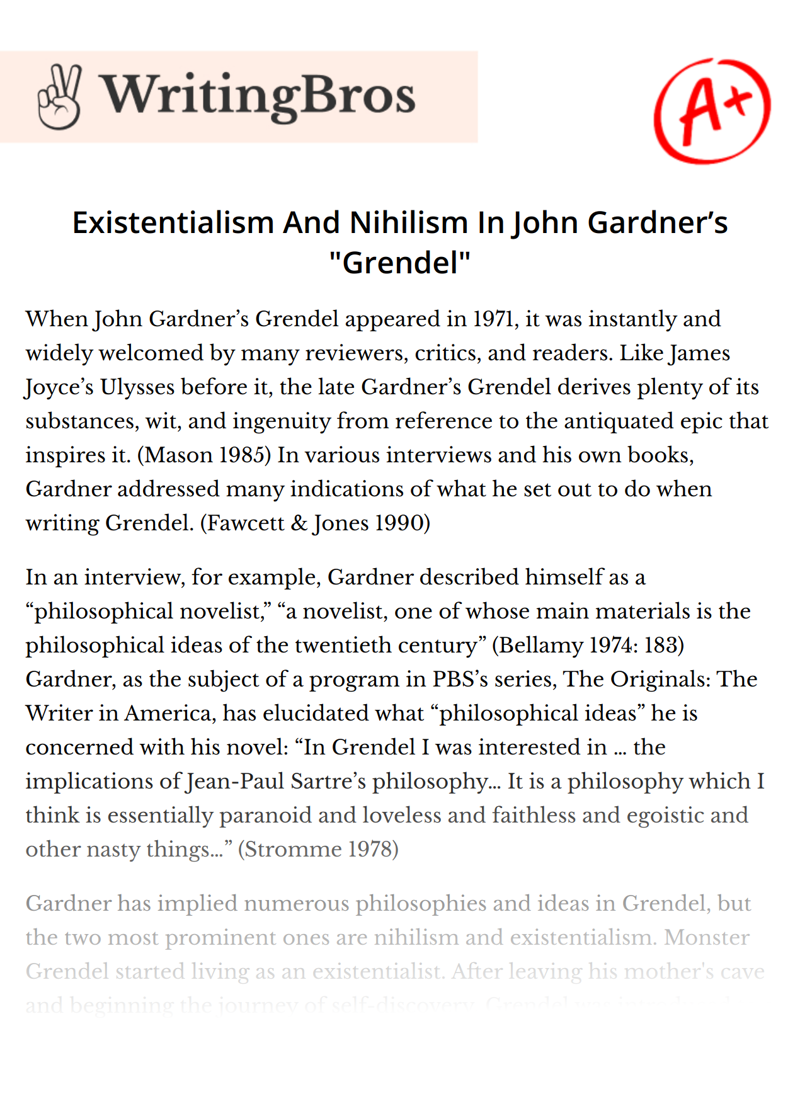Existentialism And Nihilism In John Gardner’s "Grendel"

When John Gardner’s Grendel appeared in 1971, it was instantly and widely welcomed by many reviewers, critics, and readers. Like James Joyce’s Ulysses before it, the late Gardner’s Grendel derives plenty of its substances, wit, and ingenuity from reference to the antiquated epic that inspires it. (Mason 1985) In various interviews and his own books, Gardner addressed many indications of what he set out to do when writing Grendel. (Fawcett & Jones 1990)
In an interview, for example, Gardner described himself as a “philosophical novelist,” “a novelist, one of whose main materials is the philosophical ideas of the twentieth century” (Bellamy 1974: 183) Gardner, as the subject of a program in PBS’s series, The Originals: The Writer in America, has elucidated what “philosophical ideas” he is concerned with his novel: “In Grendel I was interested in … the implications of Jean-Paul Sartre’s philosophy… It is a philosophy which I think is essentially paranoid and loveless and faithless and egoistic and other nasty things…” (Stromme 1978)
Gardner has implied numerous philosophies and ideas in Grendel, but the two most prominent ones are nihilism and existentialism. Monster Grendel started living as an existentialist. After leaving his mother's cave and beginning the journey of self-discovery, Grendel was introduced to a vast and chaotic world. As a defense against the rest of the universe, Grendel established existentialism as his philosophy. His nihilistic vision has also been developed after the Dragon’s lecture, in which as a nihilist, the Dragon demonstrates the point of meaninglessness, also known as nihilism, to Grendel. It is the vision of 'connectedness' that Grendel, as a Sartrean existentialist, thrusting his 'consciousness' against the opacity of the world and others, remains unacceptable. (Fawcett & Jones 1990)
Gardner’s restructuring of the Anglo-Saxon original points out the fact that existentialism is more of a philosophical position taken for its view of human existence than philosophy with a prescribed methodology. (Calhoun 1963) First of all, Jean-Paul Sartre, as a phenomenologist, concentrates on the study of Being; and as all the introductions to his works illustrate, Sartre distinguishes between two kinds of Being: Being-in-itself and Being-for-itself. (Sartre 1956) This argument from Sartre not only plays a fundamental role in the movement of existentialism but becomes one of the essential methods to analyze the existential concepts in Grendel. “Being-in-itself is the self-contained being without consciousness which is characteristic of things. Being-for-itself, on the other hand, is always coextensive with consciousness.
This kind of being can never be possessed as a thing is possessed.” (Colhoun 1963) This theory is aimed at describing the state of human beings to produce the sense of life and the meaning of creation, summarized as 'supporting, worrying and deceiving ourselves as much as possible.'(Storey 2011) 'A place where people can find a certain meaning.' An ontological nihilist, like Grendel, argues that it is impossible to escape the absurdity of existence, including the end of every man: death. (Crosby 1988)
Gardner, along the story, has Grendel repeatedly express his haunting sense of life’s meaninglessness. Therefore, Grendel is convinced that life is a mechanistic process in which “The sun spins mindlessly overhead, the shadow lengthens and shortens as if by plan” (7) Throughout the novel, Gardner implicitly poses the essential question: What kind of world would we have if there were no scop or shapers to make any sense beyond human existence and to fight back the forces of nihilistic vision. In other words, what it would be like to pursue the meaning in a meaningless world. Thus, Grendel goes to his grave, a confused nihilist at the end of the story, only at best half understating the dire implications of his nihilism.
Grendel's contention, as he holds quick to suspicion yet influences toward the vision, turning and curving among joke and anguish, verse and dark funniness, constantly ironizing his incongruities, is our own as occupants of the 21st century.(Fawcett & Jones 1990) This perspective from the facts of existentialism and nihilism ultimately exposes Grendel’s quest in pursuit of the meaning of life, which in turn enriches the practical meaning of those two prominent ideas.
Cite this Essay
To export a reference to this article please select a referencing style below

